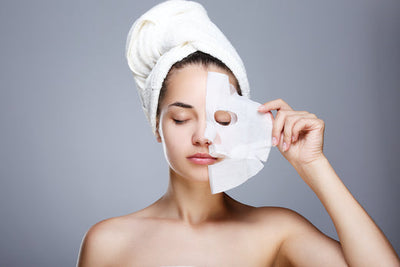Exfoliation is defined as the process of removing dead skin cells from the skin's surface. After skin cells form, they trek through the epidermis toward the top layer — drying out and dying along the way.
When cells reach the surface, if not exfoliated, they build up, making your skin look thick, rough, and lifeless. Exfoliation takes care of this buildup, removing the dead cells on the surface of your skin, revealing fresher, healthier skin.
Exfoliation is an essential process for maintaining healthy skin. Exfoliation encourages rapid cell renewal, allowing for better product absorption into the skin.
There are two significant factors for choosing the right exfoliation treatment: Skin Type & Skin Conditions.
Types of Exfoliants
Exfoliants are generally classified into the following categories: physical (also known as mechanical) enzymatic and chemical.
Physical/Mechanical Exfoliants
Scrubs
Scrubs are a slightly abrasive cream or lotion used on the face to remove a layer of dead skin and improve the complexion. Facial scrubs frequently contain microbeads made from rice or jojoba, ground almond meal, cornmeal. You should try and stay away from harsher facial exfoliants that contain ground pumice, sand, salt ground shells of apricots or walnuts as the particles can microscopically tear the skin, which can lead to irritation and inflammation. Scrubs are applied to wet skin and gently manipulated in a circular motion with the fingertips to remove excess cell buildup. They are customarily used 2-3 times weekly in a skincare routine.
Enzymes
Enzyme peels are known for their ability to gently break down the bonds holding dead cells onto the skin, accelerating the skin's natural exfoliation process. They're able to digest keratin protein and the upper layer, or stratum corneum, of our skin, which is made up of primarily dead keratin cells. Enzyme peels are one of the gentlest methods of exfoliation because they digest dead skin cells and impurities on the surface of the skin, plus they are very safe since they don't act on live tissue. Enzyme exfoliation does typically have contraindications or side effects.
Chemical Exfoliants
Lactic Peels
Lactic Peel is an alpha hydroxy acid (AHA) that is found naturally in milk, sugars and has been used in topical formulations for decades. Lactic Acid is one of the most gentle and mildest cosmetic chemical peels available on the market. Lactic Acid is best suited to those who prefer a gentler peel or those who require a less aggressive exfoliation. Also, Lactic Acid provides antibacterial and hydrating properties and is particularly crucial to skin-brightening formulations due to its ability to inhibit the enzyme tyrosinase, making it an effective -inhibitor. Those that have used Glycolic Acid for an extended period and wish to reinitiate effective exfoliation will be surprised at how effective Lactic Acid can be at boosting cell turnover - A gradual smoothing, brightening, and clearing of skin will be accomplished.
Salicylic Acid
Salicylic Acid, also known as a Beta-Hydroxy Acid (BHA), is derived from Willow Bark. Salicylic Acid Salicylic acid is an antibacterial, oil-soluble solution and is a highly active superficial peeling agent. This is considered one of the best peels for relieving congestion. Due to its larger molecular size, Salicylic Acid works more effectively on the skin's surface, which in turn is one of the most active ingredients to combat blemishes.
Harness these tried and true ingredients with our AHA Exfoliating Pads.







